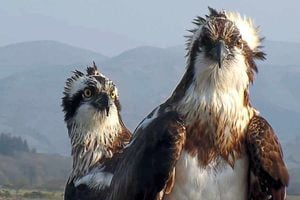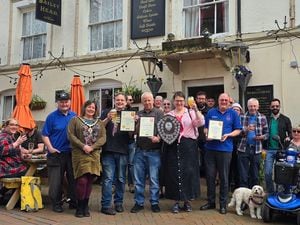Mid Wales Sanctuary boss hits back after 'vitriolic and abusive' comments
Bosses of a bird sanctuary have defended decisions made over the welfare of ospreys following criticism on social media.

Dyfi projects manager Emyr Evans said "threats, some of them very personal" had been received over decisions at the Glaslyn and Dyfi nests in Mid Wales.
He added a ringer with decades of experience had quit as a result.
Mr Evans said the projects welcomed scrutiny but had received "a torrent of critical, vitriolic and abusive comments".
Some of the criticism focused on the issue of intervention when a chick is injured or unwell – with some claiming more should be done at the first sign of trouble and others arguing against any intervention at all.
Mr Evans said decisions were based solely on what is deemed to be the best course of action at that time for the osprey and its family members – with these carrying legal implications.
There was also criticism of bird ringing – an identification tool – which Mr Evans said was strictly regulated and had "stood the test of time" for more than a century.
Voluntary
"Ringers are tree-climbers, cliff-hangers, cave-clingers and rope and ladder hugging professionals working in inaccessible and tough environments which most of us would skip a heart-beat just thinking about," he said.
"They are amongst the most respected field workers in the bird world, and most do it for no pay, purely on a voluntary basis.
"It is heartbreaking that a ringer with decades of experience and one of the most caring and compassionate people I know, decides to throw in the towel after being so upset by a tiny minority."
During the first 10 years at Glaslyn, Gwynedd, two or three chicks were born per year, "completely defying" the national average by 200 to 300 per cent, Mr Evans said in a statement released by Bywyd Gwyllt Glaslyn Wildlife and Montgomeryshire Wildlife Trust.
But in 2016, a bird was displaced from his nest at the Dyfi project near Machynlleth and photographed a few weeks later with a possible injury, while another egg did not hatch. The same situation occurred at Glaslyn.
"It's hardly ever happened before," Mr Evans said. "Some of the chicks also sustained injuries, two survived and one died but the next time we have an injured chick or an osprey in distress somewhere, the last thing we want to do is to worry about what people, sometimes thousands of miles away, may think of our decisions.
"The vast majority of you guys are completely understanding of the nature of our work and the decisions we sometimes have to make when things go wrong."
Mr Evans added the project cared deeply about the ospreys but could not always guarantee "happy ever after" endings.
And he said: "Abuse has no place in civil society. At the first sign of a limp or a cough, we can't simply scramble people together and climb a 100-foot tree or up a ladder to a 40-foot platform. These actions have consequences on all sorts of other things such as the other birds concerned, legally, and the safety of the people involved.
"These are wild birds, it's nature, it's unpredictable and it certainly isn't Disney World," he added.
Earlier this month, ospreys Monty and Glesni returned to the Cors Dyfi Nature Reserve, near Machynlleth, on the same day – as they did last year – and quickly re-established themselves on their nest.
Mr Evans said: "This was a first for us, and for Glesni.
"Her earliest return date so far had been April 3, so she beat this by two days. Over the last four years, since she has been established at this nest, she has returned on April 10, 9, 3 and 1 – a clear pattern of returning earlier each year. She was also home before Monty, another first."





